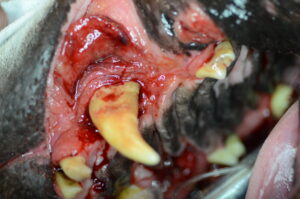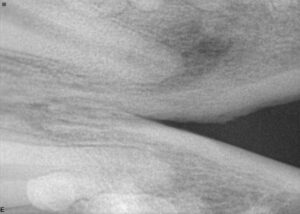09 Jun Antibiotics Do Not Eliminate Oral Disease In Dogs and Cats
The world is experiencing a crisis with regard to the overuse of antibiotics, and veterinarians are among those using them unwisely. We tend to use them without judicious consideration of the consequences. We are now ‘paying the piper’ with regard to antibiotic resistance in humans, livestock, and companion animals.
There is a very good white paper written by a friend of mine, Fraser Hale, regarding “Antibiotic Use in Veterinary Dentistry.” It was revised in 2012 and I highly advise you read this document (click here). Hale did a very good job describing why antibiotics fail to accomplish the intent of the prescriber because of the environment where the bacteria live in the mouth. Antibiotics cannot adequately penetrate an infected or necrotic tooth with endodontic disease. With periodontal disease, bacteria that is deep in the gingival sulcus and root surface can be reduced with antibiotics, but the direct cause of the problem (subgingival or root plaque/calculus) is still present. Therefore, you will get a brief improvement followed by a return to an infected state.

Generalized chronic contact mucositis/stomatitis that was treated with multiple rounds of antibiotics (unsuccessfully)
Therefore, remove the problem of infection versus placing a band-aid by using antibiotics. As Hale concluded, “Antibiotics are for the treatment of infection. They are not a vaccine against infection.”
Basic Tenets of Dental Infection as recommended by Hale:
- Get a complete accurate assessment of the problem (sedation exam, dental radiographs, probing)
- Remove the source of the problem (not just scaling and polishing)
- Do not give pulse antibiotics
- Do not routinely prescribe antibiotics prior to dental procedures
- There are exceptions to the rule. You can use antibiotics when you have removed/treated the pathology and there is indeed severe infection. Those pets with systemic disease (diabetes mellitus, renal disease, Cushing’s disease, clinical cardiac disease) can benefit from judicious usage of APPROPRIATE antibiotics.
Antibiotics in dogs and cats should only be used judiciously. Understanding when and why they can be used will help your furry dental patients.
Barden Greenfield, DVM, DAVDC
Your Pet Dentist of Memphis and Little Rock
Ref: Hale, FA. “Antibiotic Use In Veterinary Dentistry” www.toothvet.ca/PDFfiles/Antibiotics/pdf



